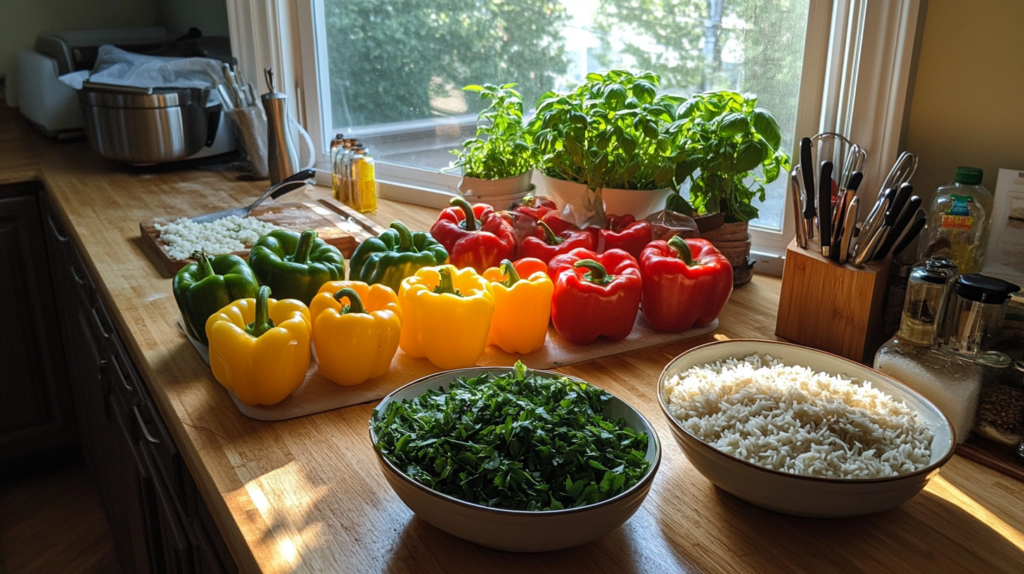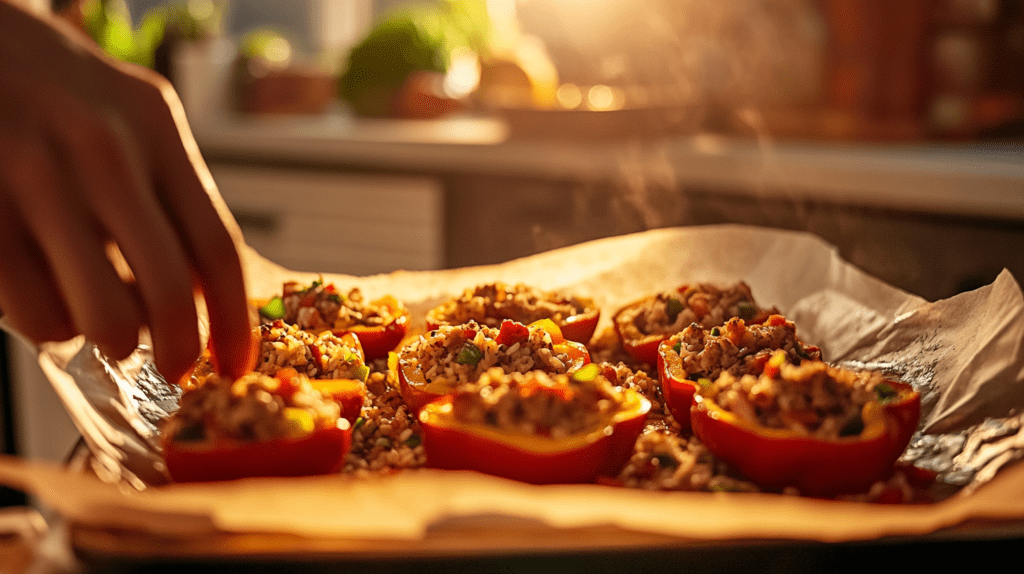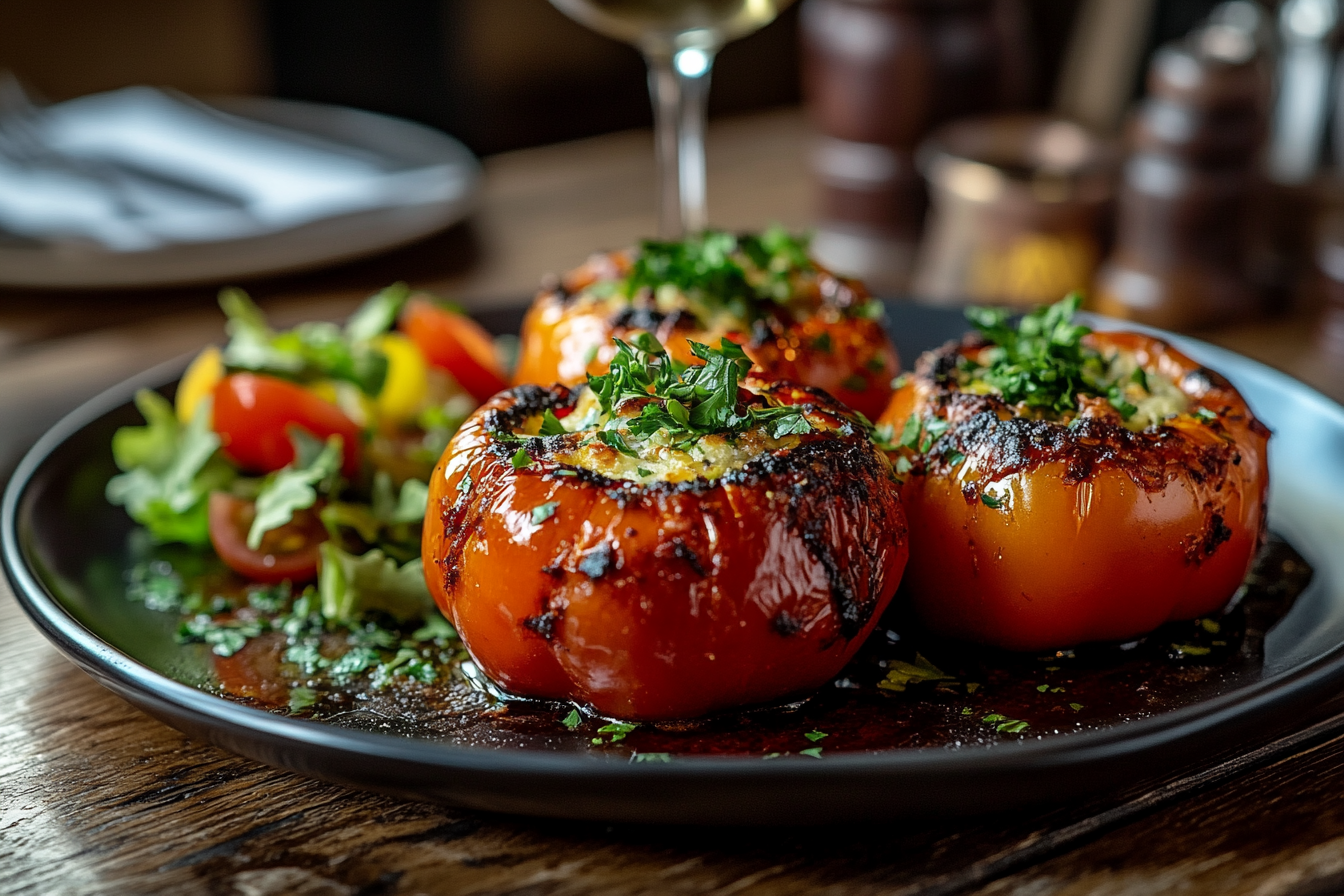Introduction
How to prevent soggy stuffed peppers? Stuffed peppers are a culinary delight, combining vibrant peppers with savory fillings for a hearty meal. Yet, a common frustration is soggy stuffed peppers, which can dampen the flavors and texture of this dish. This guide will walk you through foolproof steps to prepare stuffed peppers that are crisp, flavorful, and perfectly cooked. From choosing the right ingredients to mastering cooking techniques, you’ll learn everything you need to ensure your peppers turn out just right. Let’s get started!
Introduction to the Problem
How to Prevent Soggy Stuffed Peppers?
Stuffed peppers often lose their firm texture during the cooking process, becoming waterlogged or mushy. The culprit? It usually boils down to a few avoidable missteps in preparation or cooking techniques. Whether it’s choosing overly juicy fillings or cooking peppers for too long, understanding these pitfalls is the first step to success.
Why Do Stuffed Peppers Turn Soggy?
Common Mistakes and Root Causes
Several factors contribute to soggy stuffed peppers. For starters, using unprepared fillings like wet rice or raw ground meat can release excess moisture as they cook. Similarly, failing to pre-treat your peppers (like by blanching or partially cooking them) can leave them vulnerable to absorbing liquid from sauces or steam.
Here are the main causes:
- Overcooking the peppers: Prolonged exposure to heat breaks down the structural integrity of peppers.
- Excess moisture in fillings: Ingredients like uncooked vegetables or overly saucy mixtures can make peppers watery.
- Improper cleaning: Leaving residual water in hollowed peppers after washing can add unwanted moisture.
Preparing Ingredients
Selecting the Right Peppers
The foundation of perfect stuffed peppers lies in choosing the ideal peppers. Not all varieties work equally well for this dish, so knowing what to look for can make all the difference.
- Types of Peppers to Use
Bell peppers are the most popular choice for stuffing because of their size and shape. Their thick walls hold fillings well without collapsing. Green peppers offer a slightly bitter taste, while red, yellow, and orange peppers provide a sweeter flavor. Choose based on your taste preferences! - Freshness and Size Considerations
Always select firm peppers with shiny, smooth skin. Avoid any that have wrinkles, blemishes, or soft spots, as these indicate aging. Medium to large-sized peppers are ideal for stuffing, as they provide enough space for fillings while maintaining structural stability during cooking.
Preparing the Peppers
Once you’ve chosen your peppers, preparation is key to preventing sogginess.
- Blanching vs. No Blanching
Blanching your peppers (boiling them briefly and then cooling in ice water) softens them slightly, ensuring they cook evenly with the stuffing. However, blanching too long can make them limp. A quick 2-minute boil is plenty. - Should You Pre-Cook the Peppers?
If blanching isn’t your style, you can partially cook the peppers by baking them for 5-7 minutes before filling. This method keeps them crisp while reducing overall cooking time later. - Proper Cleaning Techniques
Always rinse peppers under cold running water to remove dirt and pesticides. After cutting off the tops and scooping out seeds and membranes, pat them dry with a kitchen towel. Any lingering water inside can contribute to a soggy texture during baking.
Filling for Stuffed Peppers
Choosing the Right Filling
The filling is the heart of stuffed peppers, and selecting the right combination of ingredients ensures a flavorful and balanced dish. Here’s how to choose fillings that enhance, not overwhelm, the peppers.
- Rice-Based Fillings
Rice is a classic choice for stuffed peppers. White rice, brown rice, or even alternative grains like quinoa and couscous can be used. Pre-cook your rice to avoid excessive moisture release during baking. - Protein Options
Ground turkey, chicken, beef, or plant-based proteins like tofu or lentils are fantastic options for adding substance. Cook the protein before stuffing to eliminate any raw juices that could cause sogginess. - Vegetables and Seasonings
Diced onions, garlic, mushrooms, and tomatoes enhance flavor and texture. However, these should be sautéed to remove excess water before mixing them into the filling. Season the mix generously with herbs like parsley, oregano, or basil, and don’t skimp on salt and pepper to boost the flavor profile.
Balancing Moisture in Fillings
Stuffed peppers thrive on balance. Too dry, and they lose their juicy appeal; too wet, and they turn soggy. Here’s how to strike the right balance.
- How to Avoid Excess Liquids
Drain ingredients like canned tomatoes or cooked spinach thoroughly. Sauces should be used sparingly or thickened with a cornstarch slurry to minimize liquid content. - Using Binding Agents
Adding a small amount of shredded cheese or breadcrumbs can help bind the filling together. These ingredients absorb extra moisture, creating a cohesive stuffing that stays put. - Balancing Sauces and Juices
If you prefer a saucier filling, use a thick tomato paste or a reduced tomato sauce. Avoid using watery sauces or uncooked canned tomatoes without draining, as these can seep into the peppers during baking.
Cooking Techniques
Baking Stuffed Peppers
Baking is the most common cooking method for stuffed peppers. However, to avoid soggy results, you need to pay close attention to the preparation and cooking process.
- Using Parchment Paper
Lining your baking dish with parchment paper prevents peppers from sitting directly in any juices that may accumulate during cooking. This small step helps maintain their structural integrity. - Optimal Oven Temperatures and Times
Preheat your oven to 375°F (190°C) for even cooking. Bake stuffed peppers for 25-30 minutes, depending on the size of the peppers and the amount of filling. To retain a slight crunch, avoid overbaking—check for doneness by inserting a fork gently into the peppers. - Why You Should Avoid Overbaking
Overbaking not only makes peppers mushy but can also dry out the filling. Cover your peppers with foil for the first 15 minutes to prevent excessive moisture loss and uncover them during the last 10 minutes to allow the tops to brown lightly.
Alternative Cooking Methods
If you’re looking to try something new or don’t want to rely on an oven, there are other ways to cook stuffed peppers while keeping them crisp and flavorful.
- Air Fryer Tips
An air fryer can create slightly crispy peppers with minimal effort. Preheat the air fryer to 360°F (182°C) and cook stuffed peppers for 10-15 minutes. Check periodically to ensure the peppers don’t overcook. - Stovetop Simmering
Place the stuffed peppers in a large pot with a few inches of tomato sauce or broth. Cover and simmer on low heat for 25-30 minutes. This method keeps them moist but requires careful attention to avoid overly soft textures. - Steaming Stuffed Peppers
Steaming is another gentle cooking method. Use a steaming basket to elevate the peppers above a simmering liquid and steam for 20-25 minutes. This process locks in flavors while preserving the peppers’ natural firmness.
Serving Suggestions
Presentation Tips
The way stuffed peppers are presented can elevate your dish from simple to stunning. A little attention to detail goes a long way in impressing family or guests.
- Arranging on a Plate
Place the stuffed peppers upright on a large serving plate or individual plates. Keep them evenly spaced to highlight their vibrant colors. A contrasting plate color—such as white or black—can make the peppers pop visually. - Garnishing with Herbs and Spices
Sprinkle freshly chopped parsley, cilantro, or basil over the top of the stuffed peppers just before serving. A light dusting of paprika or grated Parmesan cheese adds a finishing touch that’s both aromatic and visually appealing.
Accompaniments for Stuffed Peppers
Pairing stuffed peppers with complementary sides can turn them into a complete and satisfying meal.
- Side Dishes
Serve stuffed peppers with a fresh green salad, roasted vegetables, or crusty bread to add texture and variety. A creamy mashed potato or herbed couscous also pairs well. - Beverage Pairings
A refreshing lemonade or sparkling water infused with cucumber and mint is a great accompaniment to balance the flavors of the dish.
FAQs
Why Do My Stuffed Peppers Come Out Watery?
Watery stuffed peppers are often the result of excess moisture in the fillings or the peppers themselves. Ensure that all ingredients, especially vegetables and sauces, are thoroughly drained before assembling the dish. Also, pat the peppers dry after washing to prevent added moisture from accumulating during baking.
Can I Make Stuffed Peppers Ahead of Time?
Absolutely! Stuffed peppers can be assembled up to a day in advance. Store them covered in the refrigerator, then bake them when you’re ready to serve. If baking directly from the fridge, add an extra 5-10 minutes to the cooking time to ensure they’re heated through.
What Fillings Work Best for Firm Peppers?
For firmer peppers, choose fillings with a slightly drier consistency. A mixture of pre-cooked grains like quinoa or rice, combined with sautéed vegetables and protein, works well. Binding agents like shredded cheese or breadcrumbs can help keep the filling cohesive while reducing excess moisture.
Are There Healthier Options for Stuffed Peppers?
Yes, there are plenty of healthy options! Use lean proteins such as ground turkey, chicken, or plant-based alternatives. Substitute white rice with high-fiber grains like brown rice, quinoa, or farro. Load the filling with nutrient-rich vegetables like spinach, kale, or zucchini for a wholesome twist.
How Do I Know When My Stuffed Peppers Are Done?
Stuffed peppers are done when the peppers are tender but still firm enough to hold their shape, and the filling is hot throughout. Check by inserting a fork or knife into the pepper’s side—if it slides in easily but the pepper remains intact, it’s ready.
Can I Freeze Stuffed Peppers?
Yes, stuffed peppers freeze beautifully. After baking, allow them to cool completely before placing them in airtight containers or freezer bags. Reheat them directly in the oven at 375°F (190°C) for 20-25 minutes or until thoroughly heated.
Recipe for Perfect Stuffed Peppers

Ingredients
For the Peppers:
- 4 large bell peppers (red, yellow, green, or orange)
- 1 tablespoon olive oil
The Filling:
- 1 cup cooked white or brown rice (or quinoa for a healthier option)
- 1/2 pound ground turkey or chicken (or plant-based protein alternative)
- 1 small onion, finely chopped
- 2 cloves garlic, minced
- 1 medium zucchini, diced
- 1/2 cup diced tomatoes (drained if canned)
- 1 teaspoon dried oregano
- 1/2 teaspoon smoked paprika
- Salt and pepper to taste
- 1/2 cup shredded mozzarella or cheddar cheese (optional, for a gooey texture)
For Topping:
- 1/4 cup grated Parmesan cheese (optional)
- Fresh parsley or basil, chopped (for garnish)
Step-by-Step Cooking Instructions
- Prepare the Peppers:
- Preheat the oven to 375°F (190°C).
- Wash the peppers thoroughly, then cut off the tops and remove the seeds and membranes inside. Drizzle with olive oil and lightly season with salt.
- Arrange the peppers upright in a baking dish and set aside.
- Cook the Filling:
- Heat a large skillet over medium heat. Add a small amount of olive oil and sauté the onion and garlic until fragrant and translucent, about 2-3 minutes.
- Add the ground turkey (or alternative protein) and cook until browned, breaking it up into small pieces as it cooks.
- Stir in the zucchini, tomatoes, oregano, paprika, salt, and pepper. Cook for another 5-7 minutes, allowing the flavors to meld and the vegetables to soften.
- Remove from heat and mix in the cooked rice. Adjust seasoning if necessary.
- Stuff the Peppers:
- Spoon the prepared filling into the peppers, packing it gently but not overfilling. If desired, top each pepper with shredded cheese.
- Bake the Peppers:
- Cover the baking dish with aluminum foil and bake for 20 minutes. Remove the foil and bake for an additional 10-15 minutes, or until the peppers are tender and the filling is heated through.
- If using Parmesan cheese, sprinkle it on top during the last 5 minutes of baking for a golden, melted finish.
- Garnish and Serve:
- Remove the peppers from the oven and let them cool slightly. Garnish with fresh parsley or basil before serving.

Nutritional Content (Per 100g)
| Nutrient | Amount |
|---|---|
| Calories | 120 kcal |
| Protein | 7 g |
| Carbohydrates | 14 g |
| Fats | 4 g |
| Fiber | 2 g |
| Sodium | 250 mg |
Conclusion
Stuffed peppers are a versatile and satisfying dish that can easily become a household favorite when prepared correctly. By focusing on selecting the right peppers, mastering filling combinations, and using proper cooking techniques, you can avoid the common problem of sogginess and elevate this dish to its full potential. Remember, small adjustments—like pre-cooking the peppers, draining wet ingredients, and monitoring cooking times—make a huge difference in achieving that perfect balance of texture and flavor.
Whether you’re serving them as a comforting weeknight meal or a crowd-pleasing party dish, these tips will ensure your stuffed peppers turn out delicious every time. So go ahead, grab some fresh peppers, experiment with fillings, and enjoy a crispy, flavorful, and beautifully presented stuffed pepper creation. Happy cooking! 🍽️


5 thoughts on “How to Prevent Soggy Stuffed Peppers: Top Tips and Techniques”